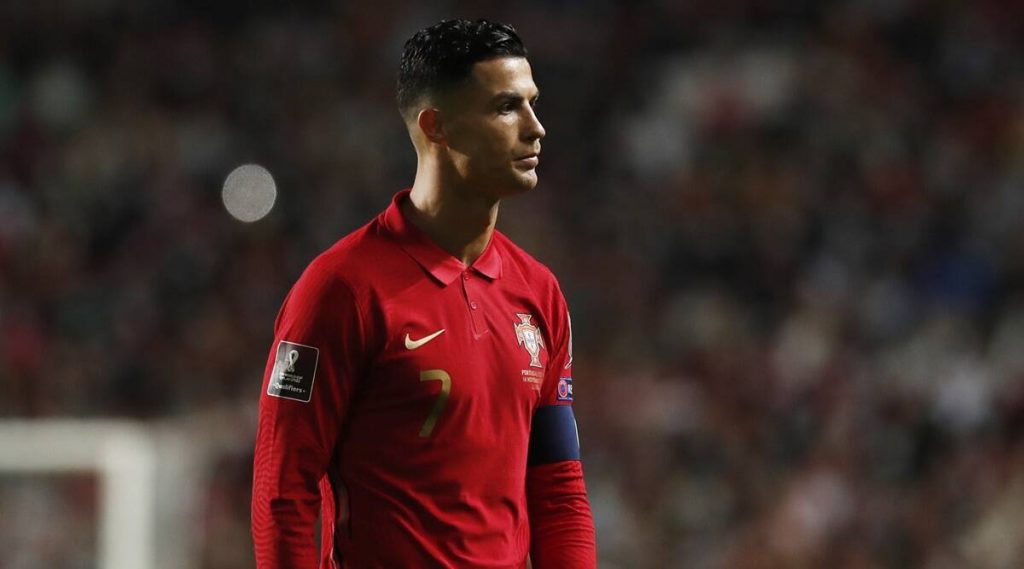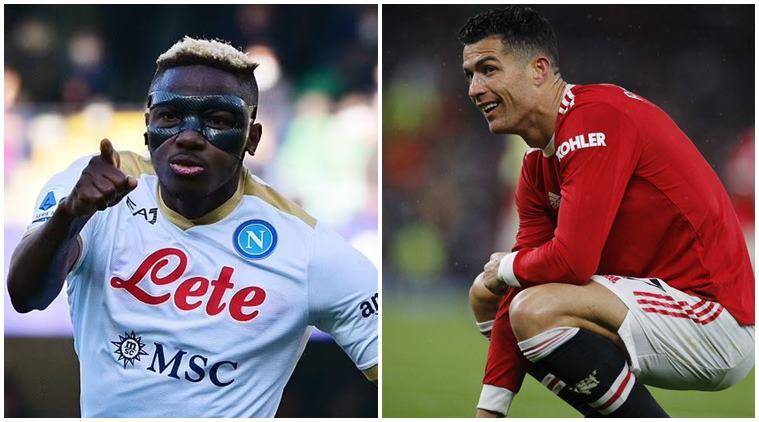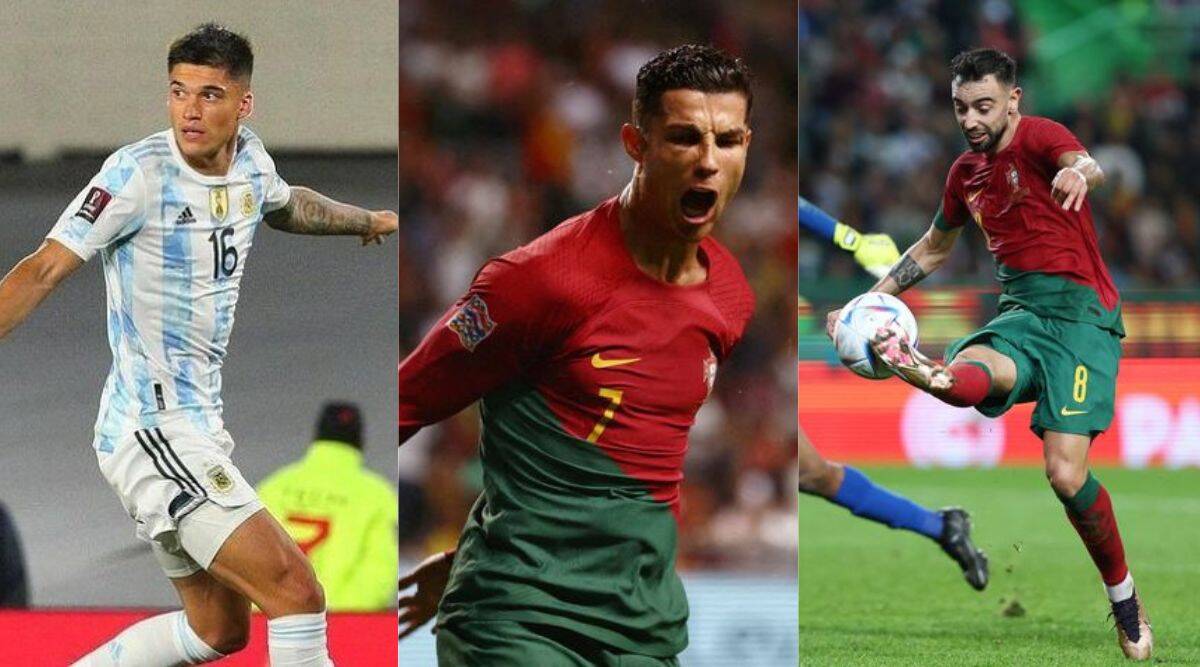Portuguese captain becomes the first player to score in five different editions of the World Cup after he converts penalty in 3-2 win over Ghana.

His eyes shut, the mind designing the shot his right foot would unleash, Cristiano Ronaldo took a deep meditative breath. The world around him stopped to take a deep breath too. He opened his firm, sharp eyes. The world did too. He took his first stride. In their mind, in their imagination, the world around him too. He took his next stride. The third was a fluid swing of his right foot. When he hits the ball exactly the way he wants to hit it, it sounds like music. Like the sweetest beat of a drum. The ball simply flew, and for a while it felt as though it would burst the net.
This was the moment for Rolando, in the 65th minute of the game, the inevitable moment, but one that seemed to never come at all.
The 37-year-old became the first player to score in five different editions of the World Cup.
In the end, Portugal showed they were more than Ronaldo, holding their nerve and beating Ghana 3-2 in a frantic thriller that sprung to life after the Ronaldo moment; they have been more than him for a while. Yet, often, it is all about him.
For all the magnitude and magic of the match, for all the drama, skills and thrills that could unfold, the silk of Joao Felix and the steel of Ghana to stir a rousing comeback, the narrative would always be woven around Ronaldo. Perhaps, as he always likes it to be.What he would, and what he would not, every stride of his dissected, every emotion he sheds inspected, every mood captured. Not solely because he is one of football’s immortals, but because of the build-up, because of the background.
How the prolonged soap opera would affect Ronaldo’s World Cup has been subject to much conjecture, hypothesis and speculation. It could be the fuel that could power his dream of winning the World Cup; it could be the perfect repartee to the Manchester United managers who had snubbed, spooked and snapped him, that they were all grossly wrong about him; it could be the glowing vindication of superstardom, the supreme triumph of individualism, that the un-bottling of accumulated frustration could cleanse his mind.
It could also be his undoing, entering the World Cup with pressure of proving his doubters and critics wrong, that his club managers were not wrong after all, that his self-absorption could hamper his team’s title charge, that he could be drowned out in the immensity of the stormy build-up, that it is an unnecessary distraction.

Whichever way it unfolds, there would always be theatre. There always is theatre with Ronaldo. Unlike his great peer, the reclusive and self-effacing Lionel Messi, Ronaldo has an irresistible affliction for the arc-lights, an unabashed, single-minded quest for ultimate sporting glory, a self-instilled, smouldering self-belief that he is above everything. It’s a bubble he has wrapped himself in. He wants the team to be built around him, he needs the team to converge into him. So it is with Messi; all teams, even PSG in his autumnal bloom, have been built around him, but he conveys, with his persona, a sense of all-for-one, one-for-all camaraderie. But with Ronaldo, perhaps for no fault of his, it seems he wants the world to gravitate towards him.
Centre of attention
With all the undercurrent steaming and rolling, the match was to be all about Ronaldo, from the second he rolled the ball to start the match to the 87th minute when he was taken off. Yet, his first 65 minutes were torturous, replete with several nearly Ronaldo moments.
This was a classic would-have-been Ronaldo moment. Ronaldo airborne, four feet from the ground, waiting to meet the floated ball with his head, pausing in his leap, arching his head so that he could guide the ball down into the gaping net. At that precise moment, Ronaldo seemed to freeze time and age. He would score a goal that would be more than a goal. A goal that could be a statement, a benediction, a vindication. But, cruelly, the ball bobbled off his crown into the cradle of the goalkeeper’s arms. He slumped down, banged the turf in anger, jumped back to his feet, and gazed skywards, perhaps to see the stars of his destiny.
Minutes later, he was kicking the turf, a tuft of grass scattered. He had crunched the ball to the corner after delightfully spinning away from Alexander Djiku, but had grazed the defender’s ankle in the build-up. A soft offence, but an offence nonetheless. He seethed, at the referee and the world at large, like a man betrayed. He was a pantomime of exasperation, arms thrown up in the air, his face a portrait of disdain. He would fling and flap his hands, shake and shrug his head, kick and shove the turf.
Everything and everyone seemed to desert him, god, fortune, and even the magnificent first touch. Just two minutes into the game, a ball was pinged onto his feet. But a heavy first touch stumbled onto the path of Baba Rahman, and in his endeavour to regain the ball, Ronaldo clattered into Rahman. The next touch was heavier. Bruno Fernandes had laid a sumptuous ball onto his channel, but the ball dribbled off his instep into sliding goalkeeper Lawrence Ati-Zigi. Ronaldo peered dejectedly into the distance.
He was even more isolated in the opening exchanges of the second half, when Ghana, docile in the first half, began to shift gears. He cut a frustrated figure, frequently admonishing his teammates for a better supply, for a sharper pass, for a better understanding of his movements. With every passing moment, the moment seemed to escape him.

